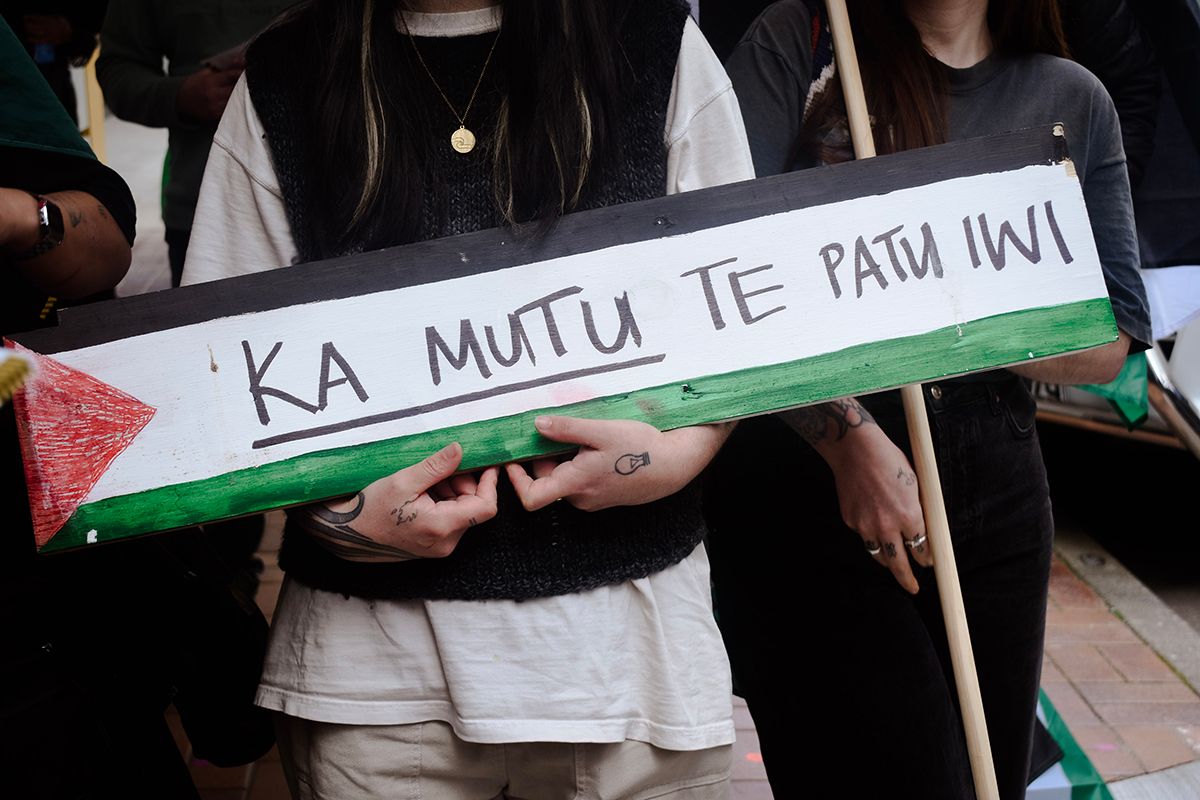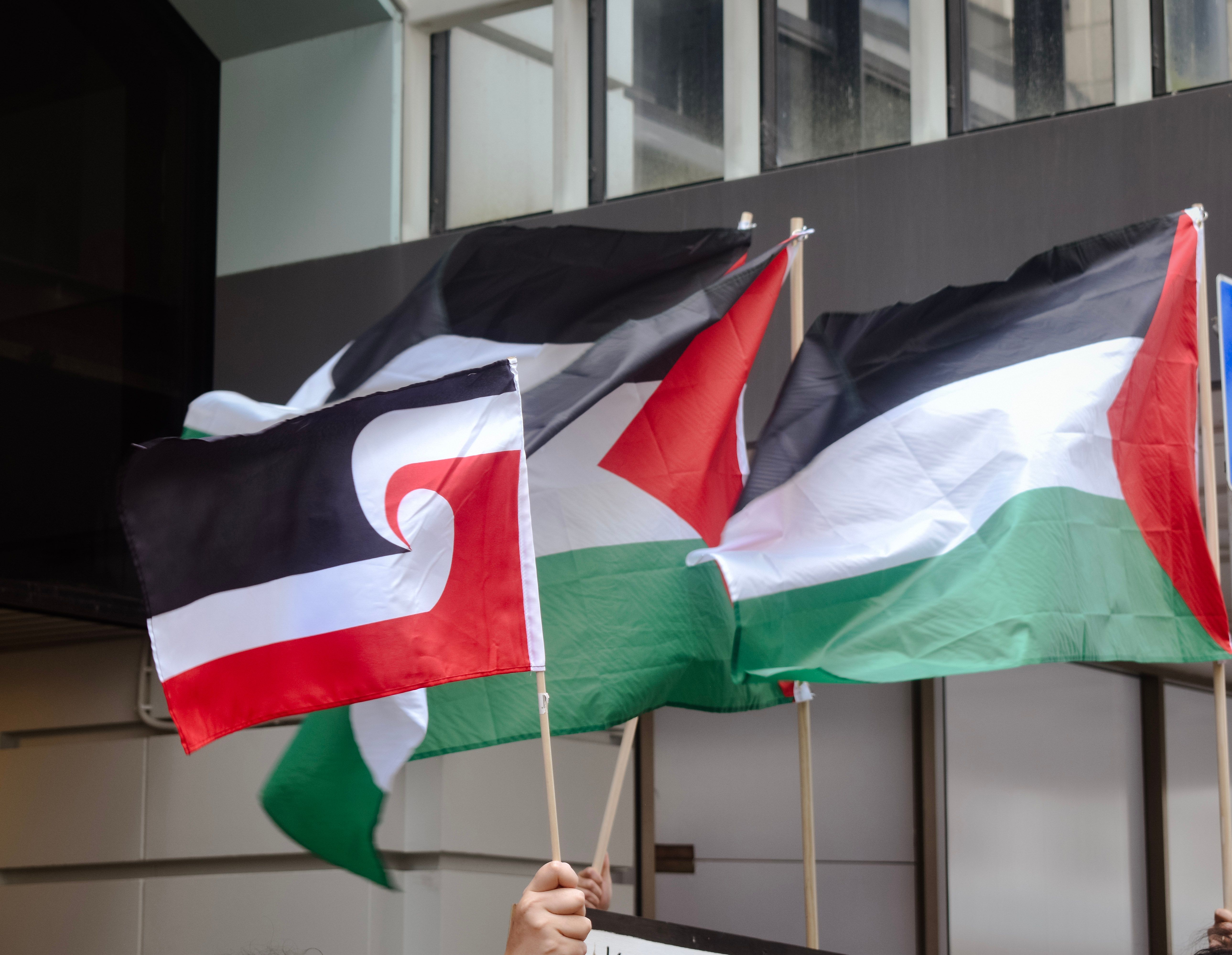Solidarity is a Verb
Nadia Abu-Shanab on solidarity, and the collective memory of resistance that empires are so afraid of.
My friend says they’ve always been suspicious of people who say they can accurately count a protest crowd. Day 14: I watch the stingy slivers of coverage of nationwide marches to end the genocide in Gaza that make the 6pm news that Saturday. TVNZ reckons “hundreds” in Tāmaki. Staring back at me from the channel’s own footage is a crowd of thousands, all soft fabric, pointed cardboard and resolute faces.
Day 19: Biden says Palestinian numbers of the dead can’t be trusted. We are weary, but we are practised at arguing over the maths of occupation. The maths of land loss. Sixteen years of humanitarian crises. Ten thousand political prisoners. Every aspect of our lives, and even deaths, is contested. We dabble at being statisticians. Repeat: “Gaza, one of the most densely populated places on earth. Home to 2.3 million residents, 50% are children.” Check: was it 70% or 80% of Gaza’s population that are the displaced descendants from hundreds of villages destroyed in the creation of Israel?
That night, sleep-deprived officials at the Health Ministry in Gaza laboured tirelessly to format 6747 names, ID numbers and ages into a report recording the murdered. They cannot name an additional 281 people who were killed, because their bodies could not be identified. I lay awake wondering what it was like for those workers – performing critical data entry at the coal face of a war crime.
Day 20: They want receipts, we have receipts. Bomb fragments found in the ruins of a refugee camp lead back to Biden’s military aid budget. Here in the ‘safe zone’, children in Gaza are writing their names on their own arms for the moment they too might be fragments in the ruins of a camp.
Day 24: Today I read that 8796 lives have been stolen. We are sure the maths is wrong here, too. Just in a different way. Friends and family of those in our community say the unrecovered bodies decaying beneath the rubble of hospitals and residential apartments are attracting flies. Many of the recorded dead are plucked from the wreckage of their neighbourhoods not by frontline responders or diggers, but by the bare hands of their neighbours.
Mass Palestinian murder is the dutiful midwife to mass international support for Palestinian liberation. This much is clear. I have long trusted that crowds would grow and grow for a free Palestine. But right now, I am trying not to estimate how many more dead Palestinian babies the world might have to see before the inevitable historical U-turn. One more is a million too many.
So there we go. Arguing over settler maths, settler myths and settler economics. And argue we must, because their numbers just don’t add up. Most of the world sees it clear as day.
Day 21: In the sea of bodies at Civic Square in Wellington, I can’t see an end to the crowd. It could be 4, 5, 6, 7 or even 8 thousand. It is without question the biggest protest Wellington has ever seen for Palestine.
I have never been good at maths. The mass of people before us feels significant to me, based on more than just the volume. There is something unquantifiable. The crowd is full of collective memory. Every time my eyes fall to meet someone in the crowd, they land on another woman wearing a moko kauae. Not always the same woman, but they all stare back at me with the same fierce knowing.
People are crying so openly. It strikes me that if I could pool the tears in front of the stage into a body of water, its saltwater currents would carry us across time and islands. From Parihaka in 1881, to Te Urewera in 2007 or 1916, to Hawai‘i in 2019, to Ferguson in 2014, to Chile on 11 September 1973, to Syria in 2011, to Lithuania in 1941, to Sri Lanka in July 1983, to Linwood mosque on 15 March 2019 – the memories of it all hang thick in the air. The descendants and survivors of attempted genocides, massacres and fascist regimes. And those who remember with them.
Our men in the crowd have heard too much silence from the world’s institutions and our failed world ‘leaders’. Every time a speaker closes, they chant our chants. But if we let the silence linger for a moment here on this land, we might recognise we are now in the practice and company of real leadership. I am trying very hard to hear a karanga that emerges from the crowd.
...I am trying not to estimate how many more dead Palestinian babies the world might have to see before the inevitable historical U-turn. One more is a million too many.
Palestinian poet and author Mahmoud Darwish said the invaders’ fear of memory was a reason to live. This last month I am uncovering what that means.
Day 5: “They are calling us savages. Animals,” I sob into the arms of a young Taranaki Whānui man I’ve just met. That week my tears were always there. He is unflinching. “We know,” he says. “We know this pain all too well.” He is remembering Waitara, Parihaka and his two koro sent to war to fight someone else’s battle.
Day 8: We are in the wake of a general election I nearly forgot was happening. I cannot get over how shiny the Luxon family are. Somewhere in Remuera there is an audible pop of champagne, a sigh of relief that things are finally back on track for the rich. I flick between channels, watching elected Israeli officials openly signal their intention for genocide and a buoyant, newly elected David Seymour. Australia voted no on the Voice referendum. The world is a dark comedy. For all the talk of terrorism, there are pictures of the Christchurch terrorist circulating the web this week with a call to kill “Hamas supporters” by heading down to the local mosque this Friday.
We are hosting a vigil at Waitangi Park. Samira and I have been talking about the persistent knots in our stomachs and she says, “It feels like if they weren’t there, we’d come undone.” The wind is lashing with a force that says, “You’d better know whose ground you’re unfurling this kaupapa on.” The wind becomes a gale that threatens to carry us away with our flags as parachutes if we are not anchored. My friends had impressed upon me that this space we are creating, on the whenua, needs to be opened right, otherwise everything will rest uneasy.
The only thing that pins us in place, that makes me able to reckon with the collective shock, grief and the restless questioning being stirred, is the presence of Te Ātiawa, the descendants of Te Whiti o Rongomai and Parihaka. Dr Catherine Love, Shamia Love-Shariff and Wayne Makarini; Marama, Josh and Ani Parata. We remember moral leadership. And right now, right here is the right time to remember these things.
In the lead-up to the war in Iraq, Western nations ignored the biggest anti-war movement they had ever seen. Choosing instead their propaganda and lies.
Day 3: “This is Israel’s 9/11,” the Israeli Ambassador to the UN says. The unapologetic anti-Arab sentiment they peddle to accompany this is invoking a lot of post-9/11 memories in us Arabs. I am 12 years old, watching the immediate emotional aftermath in New York on cable news. It is perhaps September 13th. A woman is asked for her thoughts. “If I saw a Palestinian right now, I don’t know what I would do,” she says – a threat, not a question. It lingers in my tween head because even though we don’t know who did it yet, Palestinian guilt emerges like an article of faith.
They are invoking 9/11, but they are forgetting what some of us always knew and what our movements learned to remember. In the lead-up to the war in Iraq, Western nations ignored the biggest anti-war movement they had ever seen. Choosing instead their propaganda and lies. Western nations narrated themselves as harbingers of light, standing bravely against an axis of evil, delivering democracy via cluster bombs.
You would think they might have the foresight not to invoke a memory that the people remember so differently to the political class. Under the clarifying pressure of recessions, hurricanes, rising sea levels, failed states, wildfires and a global pandemic, most Americans, including the veterans who fought in it, remember the war on Iraq as a mistake.
Day 12: Jews in the US are storming Congress, reviving the anti-war chant: “Not in our names.”
Day 17: Another friend of mine used to work in news. Like many people have, she tells me she cannot reconcile the images she sees on Instagram – of a genocide being recorded frame by frame by people on the ground – with the framing of the news. The Reuters wire copy her ex-colleagues have to upload verbatim is the stuff of an alternate universe. It is a spell, or rather a curse, we must come out from under. We can all see Al-Jazeera journalist Wael Dahdouh reporting on the murder of his own wife, children and 18-month-old grandson Adam.
Back here, I am thinking a lot about the force with which Māori, and many others, are showing their unwavering support for Palestine. I do not claim to be an expert on Māori political aspirations, but I know that many of my friends have been on a treacherous but joyful journey of reclamation. Recovering language. Connecting to land and whakapapa. Remembering. This election season, the attacks on Māori were a masterclass in the political tradition of the colonial ruling class: blame them, not us. Fear them, not us.
In Civic Square, I proclaim that we are not afraid. I want to convey confidence and hope. Organisers take responsibility for showing leadership in the face of uncertainty and despair. Of course, the truth is I wake up every day terrified for Gaza and for us all. I shake, I doubt and I question, but am held steady by collective memory and courageous collective leadership. “The land remembers. We remember,” says Green MP Teanau Tuiono on the steps of Parliament.
Perhaps the invaders should be more afraid of our memories, we are forever learning how to pool them across vast oceans. Ka mua, ka muri.
Photo by Meleseini Luhama Tau'alupe
Every piece of work has many influences. I would like to acknowledge my mate Kassie Hartendorp and the many other wāhine Māori who continually expand my understanding of solidarity as a verb.
Header image by Meleseini Luhama Tau'alupe


